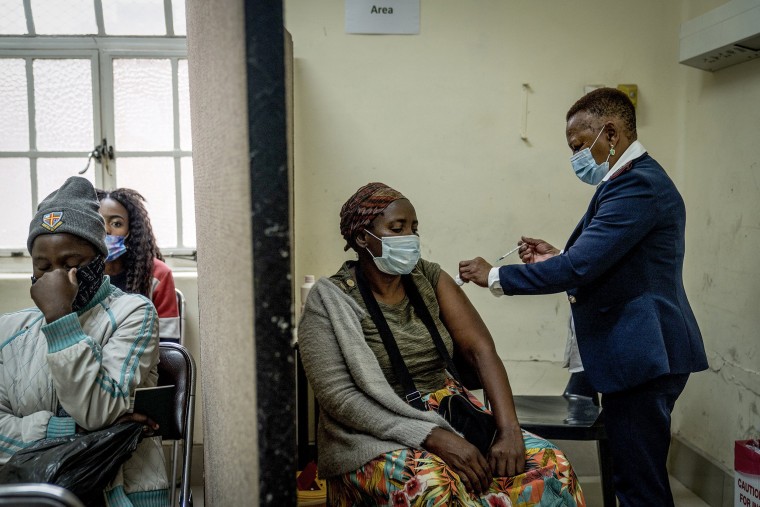The first major real-world study of the omicron Covid-19 variant found that it appeared to cause less severe illness in South Africa, where it was first discovered last month, but that two doses of the Pfizer-BioNTech vaccine offer reduced protection against it.
The analysis, released Tuesday by the country's largest health care administrator, found that on average 29 percent fewer people were being admitted to hospital in the region than previously with the delta variant. However, the study also found that two Pfizer jabs gave 70 percent protection against hospitalization from the new variant, compared with 90 percent seen in the delta wave.
Experts say it's too early to say whether these findings are good or bad news for the rest of the world.
South Africa's lower hospitalization rate could be because omicron is milder, experts say, or it could be a result of other factors such as the country's younger population, many of whom have already been infected and therefore will have gained some natural immunity.
“This could be a confounding factor for these hospital admission and severity indicators during this Omicron wave,” Ryan Noach, chief executive of Discovery Health, said in a briefing on the study.
Either way the findings appear to back up data from the vaccine makers themselves on the reduced effectiveness of two doses, and also appear to support early indications that omicron is more easily transmissible than past variants.

It was this fear that led the United States and other countries to impose travel restrictions on South Africa and its neighbors after the variant was first discovered in the region last month.
Even if omicron is milder, there is a concern among officials and experts in the United Kingdom, where the variant is now close to being dominant, that case numbers may be so huge that even a less severe version of the virus risks overwhelming health care systems.
Most early studies suggest omicron is far more transmissible than earlier variants and may be better at evading vaccines, due to the high number of mutations on its spike protein.
Boosters may offer more protection against omicron, according to studies conducted by the U.K. Health Security Agency and others.
While vaccines waned significantly in protecting from infection against the new variant, the UKHSA said, a Pfizer-BioNtech booster raised that effectiveness back up to 70 to 75 percent.
BioNTech and Pfizer said three shots of its vaccine were able to neutralize omicron in a laboratory test.
Danny Altmann, a professor of immunology at Imperial College London, said that even if omicron is “imperfectly” manageable by vaccines and boosters, “that still leaves a serious situation.”
“If transmission is considerably enhanced but hospitalizations for serious disease are ‘only’ reduced by 29 percent, the future promises even more massive pressure on healthcare capacity,” he said.
The South African study released Tuesday was led by Discovery Health in collaboration with South Africa's Medical Research Council, SAMRC. It looked at 211,000 positive cases from Nov. 15 to Dec. 7, some 78,000 of which were believed to be omicron.
“We are extremely encouraged by the results,” SAMRC President Glenda Gray said in a statement.
The study found that two doses of Pfizer-BioNTech provided just 33 percent protection against infection in South Africa compared with unvaccinated people. That's lower than the 80 percent protection that the vaccine gave against delta infection in the country.
The study showed that this protection held up for most age groups 18-79, as well as a range of chronic illnesses, but that there was a small drop-off among the elderly.
South Africa has so far used both the Pfizer-BioNTech and Johnson & Johnson vaccines. But only 26 percent of people have been fully vaccinated, according to Oxford University data, with local health officials and experts saying vaccine hesitancy is mostly to blame.
The researchers emphasized that the study's findings are preliminary and not peer reviewed. The data was gathered from the first three weeks of the country's omicron-driven wave and may change as time passes.
